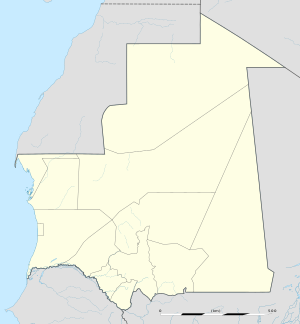The original inhabitants of Mauritania were the Bafour, presumably a Mande ethnic group, connected to the contemporary Arabized minor social group of Imraguen ("fishermen") on the Atlantic coast.

The economy of Mauritania is still largely based on agriculture and livestock, even though most of the nomads and many subsistence farmers were forced into the cities by recurring droughts in the 1970s and 1980s.

Nouakchott is the capital and largest city of Mauritania. It is one of the largest cities in the Sahel. The city also serves as the administrative and economic center of Mauritania.

The Mauritania national football team, nicknamed Al-Murabitun in the reference to Almoravid dynasty, represents Mauritania in men's international football. It is controlled by the Féderation de Football de la République Islamique de Mauritanie, and is a member of the Confederation of African Football. They have not qualified for the FIFA World Cup. However, in the Amílcar Cabral Cup, a regional tournament for West Africa, Mauritania came forth in 1980 on hosting the competition. The national football team of Mauritania later runners-up in 1995, losing on penalties to Sierra Leone after the final finished 0–0.

Slavery has been called "deeply rooted" in the structure of the Northwestern African country of Mauritania and "closely tied" to the ethnic composition of the country, despite the cessation of slavery across other African countries and a ban on the practice by colonial owners in 1905.

Greater Mauritania is a term for the Mauritanian irredentist claim that generally includes the Western Sahara and other Sahrawi-populated areas of the western Sahara desert. The term was initially used by Mauritania's first president, Mokhtar Ould Daddah, as he began claiming the territory then known as Spanish Sahara even before Mauritanian independence in 1960.

Christianity is a small minority in Mauritania, and there are around 10,000 Christians in Mauritania, mostly foreign expatriates. All of the roughly 4,500 Catholics in Mauritania are within the country's only diocese, the Diocese of Nouakchott. There are several expatriate African churches in Mauritania, though there are no more than 200 Protestants in the country, including foreigners.

Mauritania – United States relations are bilateral relations between Mauritania and the United States.

Issues impacting Women in Mauritanian society include female genital mutilation, child marriage, and polygamy.

The period from the mid-nineteenth to mid-twentieth centuries is the colonial period in Mauritania.

Mauritania, officially the Islamic Republic of Mauritania, is a sovereign country in Northwest Africa. It is bordered by the Atlantic Ocean to the west, Western Sahara to the north and northwest, Algeria to the northeast, Mali to the east and southeast, and Senegal to the southwest. Mauritania is the 11th-largest country in Africa and the 28th-largest in the world, and 90% of its territory is situated in the Sahara. Most of its population of 4.4 million lives in the temperate south of the country, with roughly one-third concentrated in the capital and largest city, Nouakchott, located on the Atlantic coast.

Mauritania Airlines previously Mauritania Airlines International, is an airline based in Nouakchott, Mauritania, serving as flag carrier of the country. The company was set up in December 2010 in response to the demise of Mauritania Airways. In April 2018, it was announced the airline had rebranded from Mauritania Airlines International to Mauritania Airlines. It is also the only airline so far operating in Mauritania.
Mauritanian Americans are Americans of Mauritanian descent or Mauritanians who have American citizenship. According to answers provided to an open-ended question included in the 2000 US census, 993 people said that their ancestry or ethnic origin was Mauritanian. According to a 2012 published report, however, about 4,000 people of Mauritanian origin live in the Cincinnati (Ohio) and Erlanger (Kentucky) areas and another 1,065 Mauritanians live in Columbus, Ohio.

Visitors to Mauritania must obtain a visa from one of the Mauritanian diplomatic missions unless they come from one of the visa exempt countries or if they arrive at Nouakchott–Oumtounsy International Airport.

The cuisine of Mauritania includes the culinary practices of Mauritania. Historically, what is now Mauritania has been influenced by Arab, Berbers and African peoples who have lived in and traversed the "stark" landscape marked with Sahara desert dunes in caravans. There is an overlap with Moroccan cuisine in the north and Senegalese cuisine in the south.
The Military ranks of Mauritania are the military insignia used by the Armed Forces of Mauritania. Being a former colony of France, Mauritania shares a rank structure similar to that of France.

Mohamed Ould Cheikh Mohamed Ahmed Ould Ghazouani, also known as Ghazouani and Ould Ghazouani, is a Mauritanian politician and retired Mauritanian Army general who is the 9th President of Mauritania, having assumed office on 1 August 2019.

The COVID-19 pandemic in Mauritania is part of the worldwide pandemic of coronavirus disease 2019 caused by severe acute respiratory syndrome coronavirus 2. The COVID-19 pandemic was confirmed to have reached Mauritania in March 2020.















